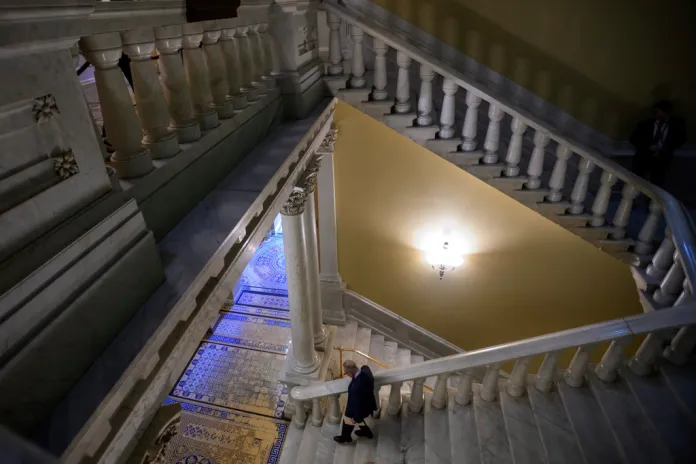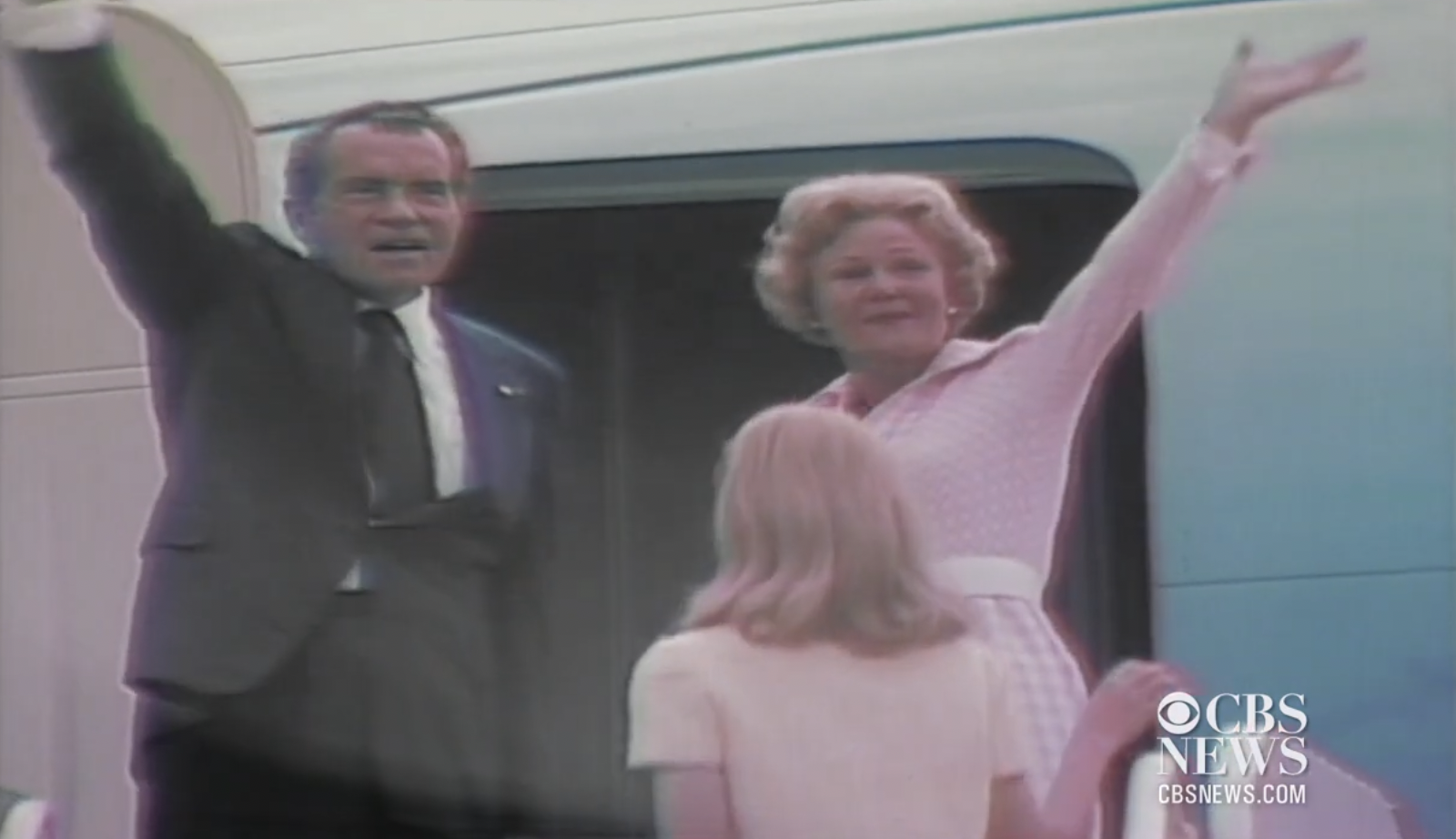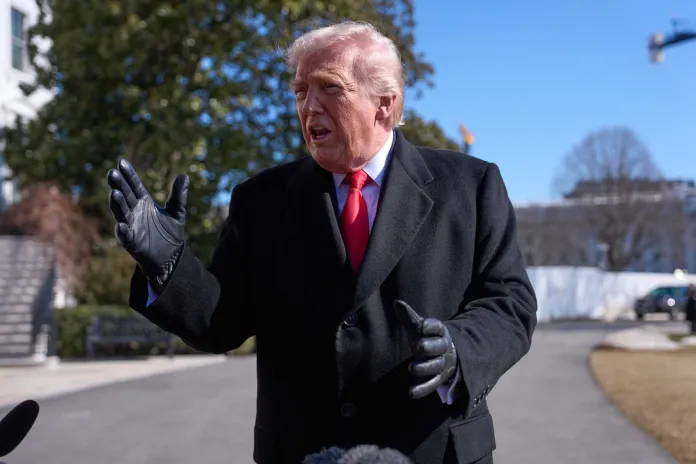Republicans look to the Supreme Court for more election wins
The article discusses an upcoming Supreme court case that could significantly alter campaign financing regulations, particularly regarding the Federal Election Commission’s (FEC) limits on how much political parties can spend in coordination wiht candidates. The case, brought by House adn Senate Republican campaign groups, argues that these spending limits infringe on the First Amendment. Experts believe that a ruling in favor of the Republicans could level the fundraising playing field with Democrats who currently have an advantage in small-donor fundraising through platforms like ActBlue. The ruling could lead to increased joint fundraising efforts and allow larger donations to be made directly to candidates, potentially flooding elections with more money from wealthy donors. Critics, including Democratic leaders and anti-corruption advocates, warn that such changes could erode existing protections against corruption in campaign finance and give disproportionate influence to affluent contributors. the case has drawn attention as it reflects a partisan divide, with Republicans seeing it as a win for free speech and Democrats expressing concern about its implications for grassroots support and general electoral fairness.
How a Supreme Court case on campaign finance could change elections
The Supreme Court could upend the way Republican and Democratic parties raise money, with experts warning it could drastically alter the influence of big spending in upcoming elections.
The high court announced last week that it would add a case to its docket challenging a decades-old rule from the Federal Election Commission limiting how much a political party can spend in coordination with candidates for political office. The case, brought by House and Senate GOP campaign groups in 2022, argues the law violates the First Amendment.
SUPREME COURT TAKES UP GOP CHALLENGE TO FEC COORDINATED SPENDING LIMITS
Experts and lawyers say the decision could reset political fundraising in upcoming cycles, where margins are thin in Congress and President Donald Trump’s name will no longer appear on the ballot to drive out GOP turnout.
The willingness of the conservative-majority Supreme Court to take the case was cheered as good news by the National Republican Senatorial Committee and the National Republican Congressional Committee.
One former NRSC official said the outcome of the case could help Republicans level the fundraising playing field with Democrats and ultimately win more elections. Democrats traditionally have a fundraising advantage with individual candidates raising “bottomless money” through platforms like ActBlue, the former GOP official said.
“What this [overturning the FEC rule] does is allow the [GOP] committees to raise larger dollars in larger batches and work directly with and give it directly to the [candidate’s] campaign, so it basically minimizes the advantage Democrats have in their low-dollar fundraising,” said the official, speaking on background to talk freely.
“It will help Republicans message more effectively, and it’ll help party committees work more directly and more frequently with the candidates,” the official added. “Republicans believe this will help more Republican candidates win.”
Currently, political parties are subject to limits when they coordinate their efforts with a candidate.
In 2025, the coordinated party expenditure limits range from $127,200 to $3,946,100 for Senate nominees, depending on each state’s voting age population. For House nominees with one representative, the limit is $127,200. For House nominees in all other states, the limit is $63,600.
Brendan Glavin, director of insights for OpenSecrets, told the Washington Examiner in an interview that overturning the FEC rule would likely result in more joint fundraising committees.
It would also allow donors who have the means to write a “max-out check” to a candidate to coordinate closely with a party and ensure their funds go directly to the person they want to support, he said.
“That makes it easier to go out to donors and solicit funds,” Glavin said.
“This provides them with a way to be like, ‘Oh, the other money’s going to the party, but I know they’re going to spend it on my candidate’s race,’” Glavin added.
The Supreme Court’s decision to hear the case has split along party lines despite experts noting it could benefit both Democrats and Republicans.
Republicans argue the government should “not restrict a party committee’s support for its own candidates.”
The former NRSC official told the Washington Examiner that backers rely on third-party independent expenditures when the party hits the FEC limit for helping the candidate directly. However, the drawback is that buying IE political advertising on the airwaves costs a lot more than a discounted candidate rate for TV ads.
If the Supreme Court strikes down the FEC limits, “it basically makes the IE irrelevant because you would do everything directly with the campaign, and you wouldn’t have to pay the extra cost for the IE rate.”
Democrats contend that Republicans are turning to the Supreme Court to short-circuit grassroots support that is already “drying up across the country.”
“They want to drown out the will of the voters,” Democratic campaign leaders Susan DelBene, Kristen Gillibrand, and Ken Martin said in a joint statement. “The DNC, DSCC, and DCCC will fight back against the Republican attempt to sow chaos and fundamentally upend our campaign finance system, which would return us to the pre-Watergate era of campaign finance.”
Issue One Senior Research Director Michael Beckel told the Washington Examiner in an interview that the Supreme Court’s ruling would have “major ramifications” on the amount of money flooding into elections. Issue One is a reform, anti-corruption group working to keep big money out of elections.
Beckel said rules such as the FEC limitations exist to “guard against corruption,” particularly in the age of super PACs, which don’t limit how much money can be funneled to campaigns.
“If the Supreme Court decides to cut down these limits, more money will flow to the political parties, and more money from big donors will help underwrite the campaigns of the candidates whose name[s] appear on the ballot,” Beckel said.
“At the end of the day, this will likely be an erosion of the anti-corruption safeguards that we’ve seen in place for decades,” Beckel added.
Charlie Spies, a lawyer specializing in political and campaign finance law, said the Supreme Court’s decision to take up the case was notable.
“Assuming that SCOTUS rules in favor of NRSC, this will strengthen party committees, which are important in [the] political process and will also help get legislation passed by giving leverage to leaders,” Spies, who has represented Republicans, told the Washington Examiner.
He added that not only will it be a win for free speech, but it will also benefit Republicans in the “short run” as Trump continues to raise money for the Republican National Committee, which could then be funneled into targeted campaigns.
Beckel said the ruling could impact grassroots or small-donor participation in elections. But he said there’s still an incentive for candidates to try to distinguish themselves from big-money contenders.
THOM TILLIS ANNOUNCES RETIREMENT AFTER OPPOSING TRUMP TAX BILL
“Anytime that you have a wealthy donor giving a large sum of money to aid a candidate, there is the potential of undue influence,” the senior research director said.
“I think the risk is real here that we will continue to see wealthy donors have an outsized influence in our campaigns and our elections,” he added.
Marisa Schultz contributed to this report.
" Conservative News Daily does not always share or support the views and opinions expressed here; they are just those of the writer."




